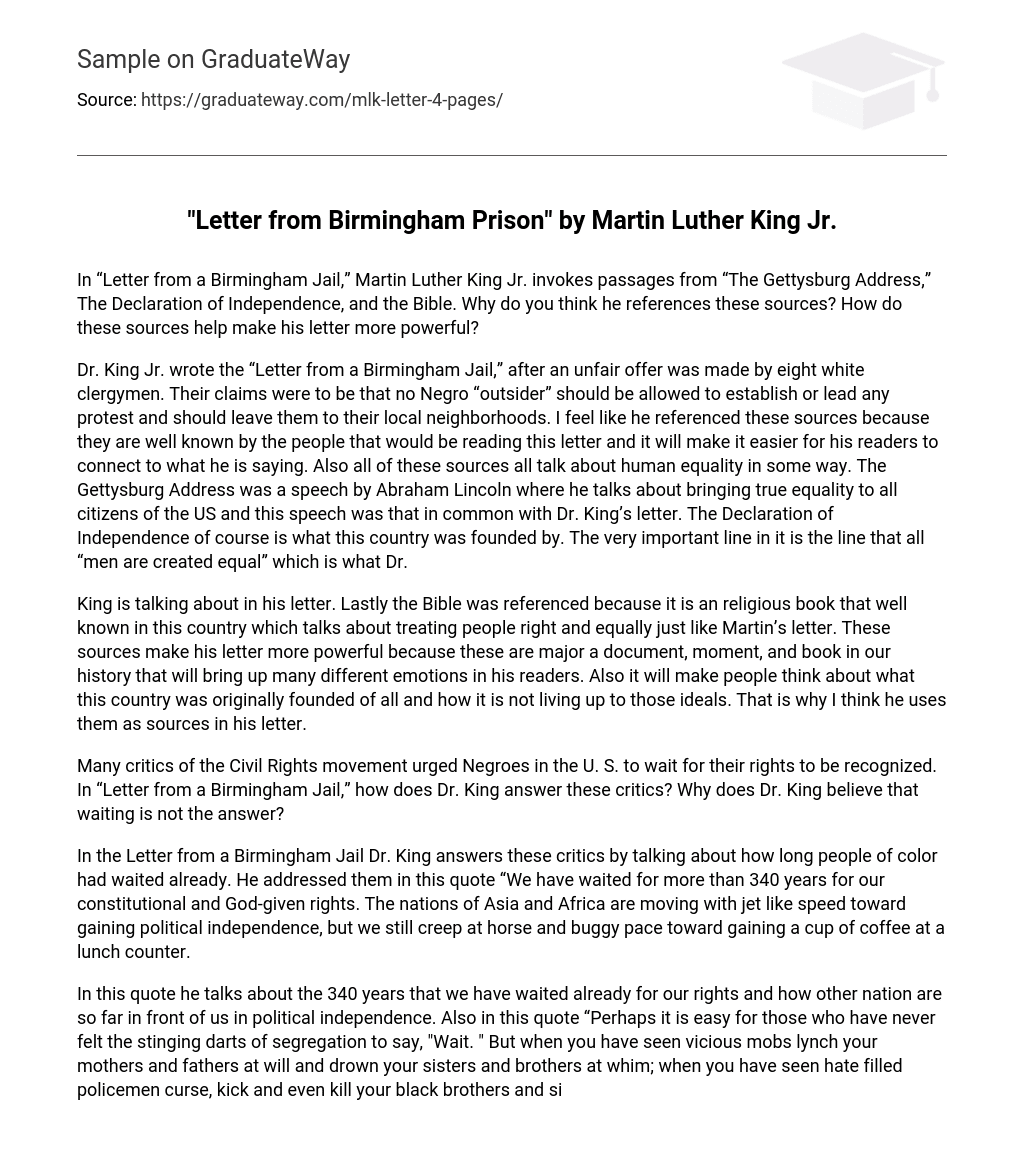“Letter from a Birmingham Jail” by Martin Luther King Jr. utilizes excerpts from “The Gettysburg Address,” The Declaration of Independence, and the Bible. The purpose behind referencing these sources is to enhance the impact of his letter. By incorporating these influential texts, King’s message is strengthened and his arguments become more persuasive.
Dr. King Jr. penned the “Letter from a Birmingham Jail” as a response to the unjust proposition presented by eight white clergymen. These individuals contended that no Black “outsider” should be permitted to initiate or lead any form of demonstration and should confine their activities within their local communities. It appears that he incorporated these references in order to establish a connection with his audience, who would be familiar with these well-known sources. Moreover, all of these works address the theme of human equality. Abraham Lincoln’s Gettysburg Address, a speech aiming to bring genuine equality to all American citizens, shares this common ground with Dr. King’s letter. Lastly, the Declaration of Independence serves as the bedrock of our nation and prominently features the significant assertion that all individuals are inherently equal.
In his letter, King discusses the significance of various sources. The Bible, a widely recognized religious book, is referenced to emphasize the importance of treating people with equality and justice, aligning with the theme of Martin’s letter. These sources enhance the power of his letter as they hold significant historical value and evoke diverse emotions in the readers. Moreover, they compel individuals to reflect upon the fundamental principles on which this country was founded and how it falls short of living up to those ideals. Hence, King’s strategic incorporation of these sources in his letter aims to prompt contemplation and raise awareness among the readers.
Dr. King addresses critics of the Civil Rights movement in his “Letter from a Birmingham Jail” who advised Negroes to wait for their rights to be acknowledged. He offers counterarguments and explains why waiting is not an effective solution.
Dr. King, in his Letter from a Birmingham Jail, responds to critics by highlighting the extensive duration of time people of color have waited for their rights. He remarks, “For over 340 years, we have patiently anticipated our constitutional and God-given rights. While Asian and African nations swiftly stride towards political independence, we, on the other hand, painstakingly crawl towards a simple cup of coffee at a lunch counter.”
In this quote, he discusses the 340-year-long wait for our rights and the significant lead other nations have in political independence compared to us. Additionally, he mentions the difficulty of understanding the concept of waiting for those who have never experienced the harsh effects of segregation. He vividly describes witnessing vicious mobs lynching loved ones and drowning siblings, as well as recounting instances of hate-driven police brutality resulting in the deaths of black individuals. He also highlights the plight of the twenty million marginalized Negro brothers trapped in poverty within a prosperous society.
According to Dr. King, waiting is not a solution because it results in the mistreatment and suffering of people of color as well as their impoverished living conditions. He argues that without actively seeking change, our fellow brothers and sisters will continue to suffer. Therefore, Dr. King firmly asserts that waiting is not the answer.
Dr. King, like Gandhi, advocates for non-violent civil disobedience but unlike Gandhi, he argues for active non-violence rather than passive non-violence.
Dr. King’s letter promotes the adoption of Gandhi’s non-violent civil disobedience as a strategy to address racial segregation and effect change. He recognizes social injustice and urges people to seek legal means rather than resorting to violent protests. Dr. King highlights the significance of bold and proactive actions, similar to his own, in attaining lasting civil rights.
The letter argues for the use of civil disobedience not only to confront unfair laws but also highlights the significance of individuals challenging unjust laws. It includes the famous quote “An injustice wherever it is, is a threat to justice everywhere”. King disapproves of the radicalization and violence promoted by the Black Power movement, stressing that “the riots achieve nothing”. He sees this approach as ineffective and in line with his belief in non-violence, morality, and faith. He believes that non-violence is both morally correct and necessary.
The author of this passage discusses why violence is not a viable solution, stating that it leads to a downward spiral and ends up multiplying the very evil it aims to destroy. While violence can kill individuals who represent lies or hatred, it cannot eradicate the lies or establish truth, nor can it eliminate hatred entirely. Instead, using violence only adds more hate and darkness to an already starless night. Darkness cannot be driven away by darkness; only light can achieve that. Likewise, hate cannot drive out hate; only love has the power to do so. After reading this letter, I believe Dr. King emphasizes the importance of non-violence as an active process.
Provide an instance from U.S. History that illustrates the concept of oppressors willingly granting freedom.
During colonial periods, Native Americans experienced assimilation, extermination, and relocation, which exemplified the fact that oppressors do not voluntarily grant freedom. Americans employed various tactics to hinder Native Americans from obtaining citizenship and integrating into society. This included subjecting them to wars, breaking promises, and forcibly relocating them. The process of assimilation was incredibly difficult and inflicted immense pain upon Native Americans.
The Native Americans were forcefully and relentlessly pushed back by the Americans, leading them to the brink of extinction. Their way of life and culture were stripped away by the Americans, leaving them powerless. Due to their limited weaponry and the diseases they contracted from the Americans, the Native Americans had little chance against their oppressors. The Americans refused to grant citizenship or freedom to the Native Americans, and even in the 20th century, their freedom was inadequate. This example from U.S. History illustrates the painful realization that freedom is rarely willingly bestowed by those in power.





